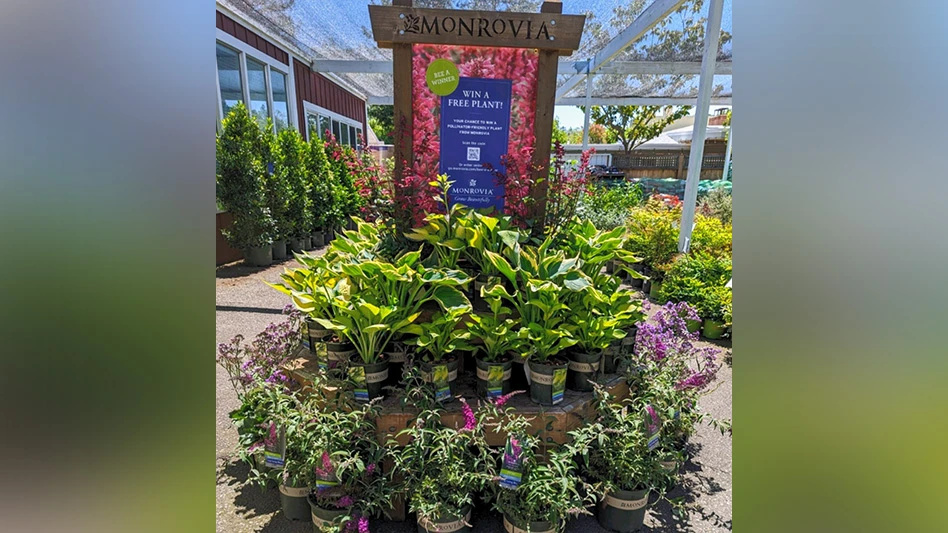
If you’re an independent garden center, then you know the name of the game these days is “differentiate.” One of the ways we keep trying to differentiate ourselves from the big box stores is by telling the story that we have great customer service. But do we really? I hate to say it, but I’ve experienced a lot of IGCs that fall face-flat when it comes to customer service, including many that have won awards as great garden centers. I’ve come across plenty of joints that are overly proud of their “independent” or “homegrown” status where the staff doesn’t seem to feel the need to be polite to customers. Sometimes, we do a much better job of convincing ourselves of our “great service” than we do our customers.
When a customer chooses to shop at an IGC, they expect to be treated like family, as they should be. People come into your store with that expectation and it’s very easy to let them down. It’s lackluster service experiences that will drive customers elsewhere in search of a lower price over you. Newsflash: It’s not just about service, it’s about manners. Manners matter.
 THINKSTOCKPHOTOS.COM |
Teach employees how to “call” the shots
Ok… this is a big one. I realize that for many people, the art of speaking on the phone has long since died out, what with texting and email being the primary forms of communication these days. That doesn’t mean we should let our staff off the hook when it comes to phone manners. If you still list a phone number for your business, then you owe it to your customers to take phone communication seriously. As a manager, and as a customer, there is nothing I can’t stand more than cashiers or service desk staff that have no manners when speaking on the phone; or when juggling a face-to-face customer and a phone call. It is an art form, but a necessary one that takes repetitive training and a lot of practice. It then takes regular monitoring from supervisory staff.
Do you have a script you use to train new staff on phone service? If not, you need one. In my years of hiring and training, I’d say a majority of people had never been taught how to speak confidently on the phone. They need sample verbiage and guidance that they can memorize at first, and then adapt organically as they become comfortable. What are they or aren’t they allowed to say to your customers on the phone? How many words do they say when they pick up? Do they ask permission to put a customer on hold? What do they say if a customer is upset? Are your POS numbers reliable enough to allow you to quote inventory quantities over the phone, or not? Can they transfer a call properly without hanging up on the customer? You have to spell out all potential scenarios for them in order to ensure they’ll respond and represent you properly.
To make phone training stick, you need to find one person on your staff that has “phone magic” and make them your Phone Maestro. My Phone Maestro was one of my senior sales staff and our garden coach, Kay Nelson. In addition to her extensive experience in the horticulture industry, she’d spent years working part-time sales for Neiman Marcus; and boy could she handle a phone call. I put her in charge of all phone training and follow up monitoring. Once I did this, phone demeanor changed dramatically. The training significantly reduced the anxiety much of the staff was feeling about phone interactions. It makes a world of difference when you have a confident person who can set the right example for staff. Bad habits can seep back in quickly though, so schedule regular phone training updates for all staff.
Oh, and one more phone peeve of mine — cell phones in the staff member’s pocket. They don’t need them while they are on duty, and it sends a terrible message to customers when they see your employees on their personal cell phone. Cell phones get turned off and go in the locker or desk drawer during work time or they’d be confiscated and put in my desk drawer ‘til the end of the day. I know, I’m a mean teacher.
 |
Maximize face time
As a manager, you’re always evaluating labor costs against tasks performed. Right person, right job. One of my continual service pet peeves was key sales staff unloading plant carts during peak sales times or seasons. That’s what your support staff is there for. It doesn’t make sense from a labor management standpoint and it certainly doesn’t make sense from a customer service standpoint.
The sales staff is there to work face-to-face with the customer to make them feel welcomed and get them hooked up with the right plants and products for their projects. They are not there to be face down in carts of plants whilst the customer wanders aimlessly looking for help. They can certainly go down the street to a big box and pay less for that kind of treatment.
Sure, there are always going to be times where the sales staff needs to water, unload and move plant material. But peak times of day, and spring, are not those times. I realize that at some point, we’ve all had moments when we want to avoid customers. But, they have this pesky habit of indirectly signing our paychecks, so it’s non-negotiable that sales staff must proactively engage with customers every time they walk into your garden center. Don’t wait for the customer to come to you. Put down the flat of plants and go to them. If you don’t, you’ve already disappointed them.
Have a plan for how sales staff should hand off maintenance duties to support staff and when. Identify your traffic peaks and valleys for every day of the week and by season. Make sure managers have a daily plan with their staff so staff can get carts unloaded and stocked in a timely fashion, when customer traffic is at its slowest. Give your sales staff permission to ignore the plant carts when there are customers ready to spend.
Check it out... the right way
Just as phones may be the first impression of your garden center for a customer, your check out procedures can leave a lasting final impression. There are a couple of simple practices you should consider implementing at the register to ensure your customers leave feeling well cared for.
You know what I hate? I hate it when a cashier dumps a wad of bills and coins in my hand without counting it. Then I have to stop and count it myself while the person in line behind me glares at me to move on. It’s just plain rude and lazy. Teach all staff with register access how to count back change properly. Yes, the old-fashioned way. I know, this means folks are going to have to do some math in their head… gasp.
If you or your managers don’t know how to do it, there are plenty of easy tutorials online. Learn it, teach it and enforce it. You’ll be amazed at how positively your customers will respond to such a simple courtesy at the register.
Do your cashiers get permission from the customer in front of them before they pick up a phone call? If not, they should. Again, you’ll be amazed at how customers respond to being asked and being empowered with the choice.
Some customers are in a real hurry, some aren’t. But you don’t know that until you ask. When they are at the register checking out, they are ready to go.Making them wait, mid-transaction, for what can turn out to be an extended phone call with another customer is just not good manners.
Your cashiers and service desk staff need to work as a team to pick up calls that an otherwise occupied cashier obviously cannot. During peak times at the register, assign phone back up staff if you can. If not, use a special daytime mailbox in your phone system to accept calls for short bursts of high store traffic. Then assign someone to check voicemails and return calls within a two to four hour period.
Providing real quality service at an IGC requires exacting standards and tenacity. Procedural and etiquette training has to be repetitive and ongoing.
We want customers to appreciate our quaintness, charm and uniqueness. But for those traits to shine, we have to get back to some of the basic core manners of customer service.
Leslie Finical Halleck owns Halleck Horticultural, through which she provides horticultural marketing, business consulting, social media management and content generation for green industry businesses. Leslie is a Certified Professional Horticulturist (CPH) via ASHS, with more than 20 years of industry experience. For the past eight years she served as General Manager for North Haven Gardens, a well-respected independent garden center in Dallas, Texas. www.lesliehalleck.com

Explore the August 2013 Issue
Check out more from this issue and find your next story to read.
Latest from Garden Center
- This Florida garden center's busiest days are in the fall, not spring. Find out how they do it
- Terra Nova Nurseries releases new agastache variety, 'Peach Pearl'
- The Certified Shopify Online Garden Center provides local retailers with ecommerce tool
- Meet the All-America Selections AAS winners for 2025
- Endless Summer hydrangeas and Suntory Senetti glam up Grammys red carpet
- Ball Seed releases 2025 edition of 'Thrive and Flourish' for landscape and garden retail
- American Floral Endowment's Fred C. Gloeckner Foundation Research Fund accepting grant proposals
- Floral Marketing Fund and CalFlowers partner to advance floral industry





